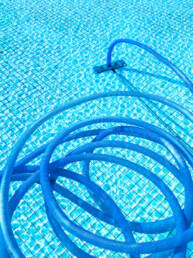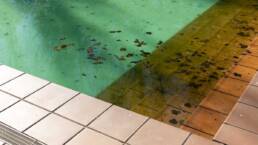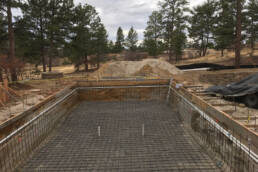Spring in Denver is a beautiful time—flowers bloom, temps rise, and pool season officially begins. But with all that sunshine comes a wildcard: unpredictable spring storms. From sudden downpours and hail to high winds and snowmelt runoff, Colorado’s spring weather can wreak havoc on your backyard pool if you’re not prepared.
And it’s not just about a few leaves in the water. Severe spring storms can lead to:
- Clogged filtration systems from debris overload
- Water contamination from yard runoff, pesticides, and dirt
- Flooding or equipment damage caused by overwhelmed drains or improper grading
- Safety hazards like broken fencing, unsecured covers, or power surges affecting pool automation systems
For pool owners across the Front Range, these issues can turn a peaceful backyard escape into an expensive clean-up project overnight.
That’s why storm prep isn’t optional—it’s essential.
At Laguna Pools, we help Denver homeowners stay one step ahead of spring’s unpredictable weather. In this guide, we’ll walk you through smart, proactive steps to safeguard your pool before, during, and after spring storms roll in.
From choosing the right pool cover to upgrading drainage and post-storm recovery, these tips will help you protect your investment—and make sure your pool is ready when the sunshine returns.
Assess Your Surroundings: Landscaping and Yard Risks
Before the skies darken and the wind picks up, take a walk around your yard. You might be surprised by how many elements in your landscape can become a threat to your pool during a storm.
Overhanging Trees and Loose Branches
That beautiful shade tree hovering near your pool may be more of a liability than a luxury in spring. High winds and heavy snow can easily snap dead or brittle branches, dropping them directly into your water—or worse, onto your pool cover or deck.
- Trim back overhanging limbs, especially those above or near the pool.
- Remove any dead or decaying trees that could fall in strong winds.
- Consider hiring a certified arborist to assess tree health if you’re unsure.
Deck & Yard Debris
Loose items left around your pool can become dangerous projectiles during a spring storm and cause physical damage to your pool surface, liner, or equipment.
- Secure or store lightweight items like pool toys, floats, umbrellas, and outdoor cushions when a storm is in the forecast.
- Anchor heavy furniture or move it indoors temporarily.
Landscaping Runoff Hazards
Denver’s spring storms often arrive with torrential rain, and that water has to go somewhere. If your landscaping is sloped toward the pool or lacks proper edging, runoff can wash mulch, soil, and lawn chemicals into the water—leading to cloudy water, chemical imbalances, and increased algae risk.
- Install or update landscape edging or gravel barriers to redirect runoff.
- Avoid applying fertilizers or pesticides just before a storm to minimize contamination.
- Keep mulch beds neatly contained and avoid overfilling near the pool.
By taking a few simple steps to assess and adjust your landscape, you can dramatically reduce the mess and maintenance you’ll face after the storm has passed.
Secure or Upgrade Your Pool Cover
When it comes to spring storm prep, a durable and well-fitted pool cover is your first line of defense. It protects your water from airborne debris, prevents rainwater contamination, and reduces the risk of damage to the pool surface. But not all covers are created equal—and not all of them are storm-ready.
Why a Strong Pool Cover Matters
A loose or poorly maintained cover can become a liability in a storm. High winds can whip unsecured edges loose, turning your cover into a sail. Torrential rain can weigh it down, causing sagging or even structural failure.
Investing in a high-quality, storm-rated pool cover helps:
- Prevent large debris like branches and leaves from entering the pool
- Minimize water contamination from dirty rainwater and yard runoff
- Reduce cleanup time and protect your pool’s interior surface and finish
- Avoid stress and damage to skimmers and filtration systems due to excess debris
Types of Covers to Consider
Depending on your pool type and usage, here are a few options to think about:
- Mesh Safety Covers: These allow water through while blocking debris—great for high-wind areas but require proper drainage to avoid overflow.
- Solid Safety Covers: Fully block debris and water, providing the highest level of protection. Some models come with built-in drainage panels.
- Automatic Pool Covers: Excellent for convenience and daily protection, though not all are designed to withstand extreme storm conditions.
If you already have a cover, inspect it thoroughly:
- Check for rips, tears, or weak seams
- Ensure anchors and fasteners are secure
- Replace worn-out straps, springs, or grommets
- Tighten tension as needed to prevent sagging
Not Sure What You Need? We Can Help
At Laguna Pools, we offer custom pool cover consultations and installations throughout the Denver metro area. Whether you need a new safety cover or just want your existing one inspected before storm season, our team is ready to help you find the right fit for your pool—and your peace of mind.
Protect Pool Equipment from Wind and Water
Your pool isn’t the only thing at risk during Denver’s spring storms—your pool equipment is just as vulnerable, and often even more expensive to repair or replace. Pumps, filters, heaters, and automation systems are all sensitive to flooding, power surges, and debris. A little prep work now can help you avoid major headaches later.
Elevate and Shield Your Equipment
Most residential pool equipment is installed at ground level, often tucked beside the pool or up against the house. Unfortunately, that makes it prone to water damage from storm runoff or flooding—especially during heavy rainstorms or rapid snowmelt events.
- If possible, elevate your equipment pad using pavers or a poured concrete riser to lift pumps and electrical components above grade.
- Install a weatherproof equipment cover or housing to shield systems from wind-driven rain and flying debris.
- Make sure your drainage around the pad is graded properly so water flows away from the equipment—not toward it.
Secure and Power Down Before the Storm
If a major storm is forecasted, it’s smart to turn off your pump and filtration system ahead of time. This prevents potential electrical damage if there’s a surge or lightning strike.
- Use a dedicated pool breaker to safely shut down power to the system.
- Unplug automation panels or smart controllers if lightning is expected.
- Double-check that valves are closed, fittings are tight, and hoses are secure to prevent suction issues or leaks.
Don’t Forget Accessories
Automatic chlorinators, pool cleaners, and robotic vacuums should be removed from the pool and stored indoors during a storm. These devices are costly and often fragile—leaving them in during high winds or flooding can shorten their lifespan or void warranties.
At Laguna Pools, we can help you storm-proof your equipment area with drainage improvements, protective covers, and professional equipment inspections. Whether you’re prepping ahead of time or recovering from damage, we’re your go-to partner for pool system care in the Denver metro area.
Improve Pool Drainage and Overflow Management
Denver’s spring storms don’t hold back. One moment the skies are clear, the next you’re dealing with torrential rain, melting snow, or both—flooding your yard and overwhelming your pool. If your drainage system isn’t up to the challenge, stormwater can do serious damage to your pool structure, landscaping, and even nearby foundations.
Clear Existing Drains and Gutters
Start with a spring tune-up of your entire drainage system:
- Clean out deck drains, scuppers, and skimmer lines to ensure fast-moving water has somewhere to go.
- Make sure downspouts and gutters are not draining directly toward your pool or equipment pad. Use splash blocks or downspout extenders to redirect runoff.
- Remove any leaves, pine needles, or mulch from drainage grates that can easily clog during a heavy storm.
A clogged drain might seem minor, but it can cause pool flooding, deck erosion, and liner separation—all costly and time-consuming to repair.
Install or Upgrade French Drains
If water tends to pool near your pool deck or equipment pad, a French drain system might be the solution. These underground channels help redirect excess water away from vulnerable areas.
- French drains are ideal for yards with poor grading or clay-heavy Denver soils that don’t absorb water quickly.
- You can also pair them with sump pumps or catch basins in areas prone to standing water.
Monitor Pool Water Levels
Heavy rain can cause your pool to overflow, pushing water into the surrounding landscape and even back into your skimmers and equipment lines.
- After a major storm, use a submersible pump or open the waste line on your filter to lower the water level if needed.
- Consider installing an automatic overflow system or float valve to help manage water levels automatically.
Not sure if your drainage system is storm-ready? Laguna Pools offers drainage evaluations and upgrades tailored to the Denver climate. We’ll help you prevent water from turning your backyard oasis into a muddy mess.
After the Storm: Cleanup and Water Quality Recovery
Even if you prepare thoroughly, spring storms can still leave your pool looking like a disaster zone. From floating debris to cloudy water, the aftermath can be frustrating—but with a calm approach and the right steps, your pool can be back to normal in no time.
Skim, Vacuum, and Remove Debris
Start by removing large debris like branches, leaves, and twigs using a leaf net or surface skimmer. Do this as soon as possible to prevent organic matter from breaking down in the water, which can quickly disrupt your chemical balance and lead to algae growth.
- Use a manual or robotic pool vacuum to remove sediment from the pool floor.
- Empty the skimmer and pump baskets regularly to maintain good circulation.
- Don’t forget the pool deck—sweep and rinse it to prevent debris from blowing back into the water.
Check and Clean the Filtration System
Your filter will be working overtime after a storm, so give it the attention it deserves:
- Backwash sand and DE filters or rinse off cartridge filters to ensure optimal performance.
- Monitor the filter pressure gauge—if the pressure is unusually high or low, your system may be clogged or struggling with circulation.
If the filter was off during the storm, flush the system before resuming regular use.
Test and Balance the Water Chemistry
Storms often bring in contaminants like dirt, pollen, bacteria, and lawn chemicals, which can throw off your water chemistry fast. Even rainwater alone can dilute chlorine and change your pH levels.
- Perform a full water test checking chlorine, pH, alkalinity, and calcium hardness.
- Shock the pool to kill any lingering bacteria or algae spores.
- Adjust pH and alkalinity levels gradually and allow the system to circulate for 24 hours before retesting.
Cloudy water, discoloration, or algae blooms can appear even a few days after a storm—so monitor your pool closely in the days that follow.
At Laguna Pools, we offer comprehensive post-storm pool clean-up services in the Denver metro area. Whether your pool needs a one-time recovery session or a full rebalancing, our experienced team is just a phone call away. Let us do the dirty work so you can get back to enjoying your pool.
Call Laguna Pools for Storm Protection & Cleanup
Spring storms in Denver can strike fast and leave a mess in their wake—but you don’t have to handle it alone. Whether you’re looking to prevent damage before a storm or need expert help with post-storm recovery, Laguna Pools is your trusted local partner for all things pool care.
What We Offer
Pre-Storm Pool Inspections
We’ll assess your current setup—including pool covers, drainage, and equipment placement—to help you prepare for whatever the season throws your way.
Custom Pool Cover Installations
We offer and install a variety of heavy-duty, weather-resistant covers to help you safeguard your pool against wind, rain, and debris.
Drainage and Equipment Protection Solutions
From upgrading your yard’s grading to enclosing vulnerable pump systems, we tailor solutions to your property’s unique needs.
Post-Storm Cleanup and Water Recovery
Our technicians will remove debris, restore water clarity, and rebalance your pool chemistry fast—so your backyard is ready for sunny days again.
Whether you’re a new pool owner or a seasoned pro, our team brings experience, reliability, and friendly service to every visit. As Denver’s go-to pool maintenance experts, we’re here to help you keep your pool clean, clear, and storm-ready—year after year.
Conclusion: Storms May Be Inevitable—But Pool Damage Doesn’t Have to Be
Spring in Colorado can be unpredictable, but your pool care doesn’t have to be. By taking proactive steps—like securing a strong pool cover, improving drainage, and preparing your equipment—you can avoid costly repairs and enjoy peace of mind all season long.
And when the skies clear? You’ll be ready to kick off a perfect swim season with clean water, safe systems, and a backyard that’s built to weather the storm.
Need help getting started? Let Laguna Pools help you protect your investment and enjoy your pool stress-free this spring. Contact us —we’re here to help you swim smarter.

Ready for an expert opinion? Get in touch today!
Laguna Pools is a professional pool and spa contractor that has been servicing the Denver area for over 20 years. We offer routine cleaning and maintenance services, new pool design, construction, and remodeling.
Like this article? Spread the word!
Related Posts
April 15, 2025
Spring Pool Opening Checklist: Get Ready for a Sparkling Season
Get your pool ready for the season with this spring opening checklist! From chemical…
March 15, 2025
Planning for a Pool Construction in Denver with Laguna Pools
Planning to build a pool in Denver? Discover expert tips for designing, budgeting, and…
March 15, 2025
Repair & Equipment Replacement with Laguna Pools: Getting Your Pool Ready for Summer
Get your pool ready for summer with expert repair and equipment replacement services from…





